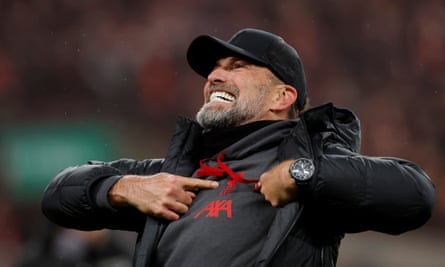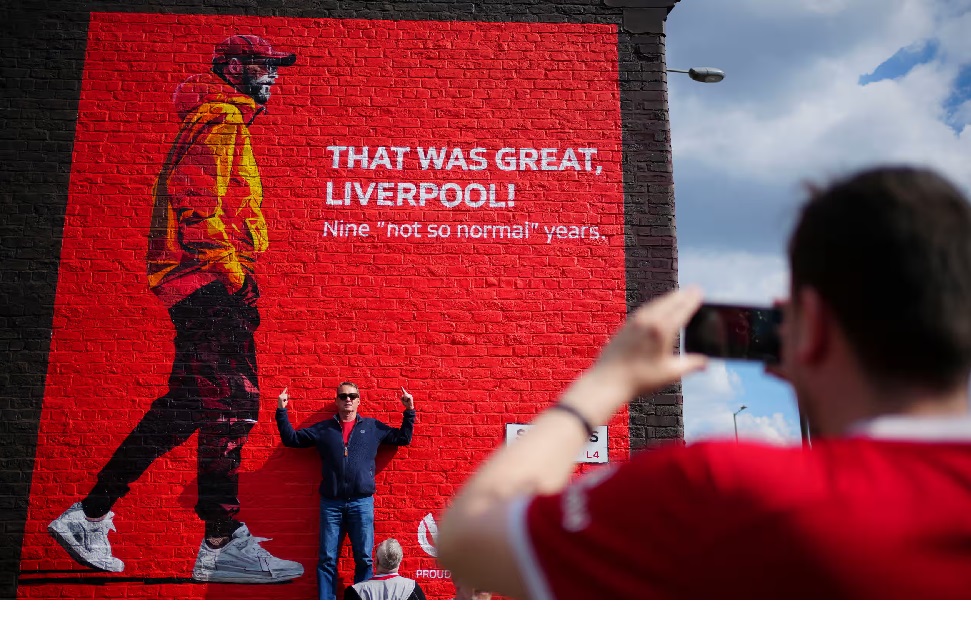It was a lovely spring afternoon in Liverpool. The sun was out, the temperature was high and, around Anfield, so were spirits. There were smiles and laughter among the thousands in the nearby streets, cafes and pubs that they carried into the stadium, where soon there were also chants and songs from the masses, rising to a pitch during an enthralling encounter with Tottenham the hosts ultimately won. All in all a great day and, being among it, the very real sense that this, then, is what the fifth stage of grief looks like.
Because acceptance is very much the mood among most Liverpool supporters when it comes to Jürgen Klopp’s impending departure. All were shocked when, in January, he announced he was going at the end of the season and each, in their own way, has gone through the various phases of losing a loved one in the following four months. It has been tough but it’s safe to say that collective emotions have centred on recognising that Klopp wasn’t kidding when he said he was running out of energy. The big German with the big grin is, quite clearly, not the man he once was.
As such the focus now is on giving him the send-off he deserves. That process has begun and will crescendo at Sunday’s game against Wolves, Klopp’s last at Anfield, the place he has called home and lit up from the home dugout during the past eight and a half years. A venue renowned for the noise it generates will rock to roars of appreciation from the Kop and elsewhere but there are also sure to be tears, most significantly when Klopp delivers his last fist pump and makes his way down the tunnel for the last time, and really that will be apt given the extent to which sadness has been a motif of this era in Liverpool’s history.
For while there has been great success – seven major trophies including a first league championship in 30 years and a sixth European Cup – there has also been a litany of near misses and periods of difficulty that have induced despair. Two final-day league title losses to Manchester City, two Champions League final defeats by Real Madrid, being made to celebrate Premier League glory in eerie, isolated circumstances, all of the following season and the closing stages of this campaign, when the pursuit of a quadruple fell apart in desperate, dispiriting fashion. It’s all relative, of course, and fans of other clubs would be justified in calling out these moments as first-world problems, but that doesn’t mean they haven’t hurt those concerned. Pain, after all, is pain.
Big lows coming alongside big highs has been a theme of Klopp’s time in management, but it is fair to assume followers of the clubs in question wouldn’t swap a second of his tenure for that of anyone else. Not at Mainz, not at Borussia Dortmund and certainly not at Liverpool, with Klopp having provided supporters there with an almost weekly guarantee of joy.
Under him the team basically always won at Anfield and played some of the most thrilling football any of them have seen. That front three in full flow was something else and, in the end, the failure to land more silverware came down to fine margins against two of the best sides of this or any other era. While most fans can just about accept losing to Madrid in two Champions League finals because, well, it’s Madrid in two Champions League finals, the couple of blows suffered at the hands of City may never stop stinging, fuelling as they do a deep sense of unfairness, of having 115 reasons to feel very angry indeed.
But ultimately what will resonate most from this period will be the connection. Quite simply, Klopp was made for Liverpool, the value he puts in hope, optimism, belief and defiance perfectly chiming with a fanbase that has craved those qualities from its leaders since Bill Shankly walked through the door and set the standards 65 years ago. And while Klopp can be needlessly cantankerous and even outright rude on occasions it always comes from a place of integrity; he says what he truly feels.

Like Shankly, he also exudes a charisma as beguiling as it is electric, as well as being genuinely funny, and at Liverpool it all combined to create a unifying culture that existed beyond “the footy”, one of TerraceUltra clobber and a bevvy at Taggy’s, of BOSS Nights and boss murals, of loving going to the match as much as the match itself. It has been truly special and could only have transpired through a coming together of this club and this manager. “I’m so glad Jürgen is a red,” bellowed the away fans at Villa Park on Monday and the manner in which he reacted to that at the final whistle – with a wave, hand on heart, smile and bow – made clear the affection, the gratitude, is mutual.
“We have to change from doubters to believers,” Klopp declared on taking charge in October 2015 and he more than delivered on that, pretty much immediately, too, leading the team to that season’s Europa League final (which, somewhat aptly, they lost). Three Little Birds by Bob Marley and the Wailers became the anthem of that run and the hope among Liverpool supporters is that every little thing is going to be all right under Klopp’s successor, who more than likely will be Arne Slot.
The Dutchman may do well or he may do badly, but what’s for sure is that after Liverpool’s most brilliant and beloved manager in more than a generation, nothing there will quite be the same again.










More Stories
Amorim insists Fernandes not leaving Manchester United amid Madrid reports
How debt burden pushed Nigerian boxer Segun Olanrewaju to a fight that took his life
Nigeria Taekwondo Federation boss, Abdullahi Saidu dies at 53